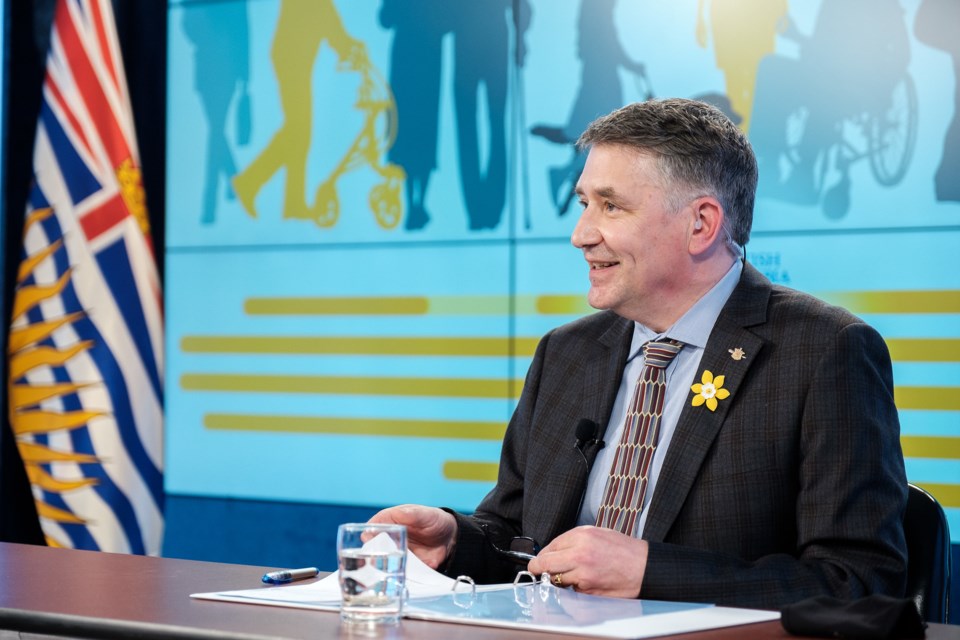Powell River-Sunshine Coast MLA Nicholas Simons says he hopes his first bill introduced at the B.C. legislature as minister of social development and poverty reduction will lead to accessibility standards in the province in about 18 months.
“By end of 2022 [it] would be good to see some standards established,” Simons told Coast Reporter after the bill was tabled on April 28.
Described as an enabling act, Bill 6 or the Accessible British Columbia Act – if adopted – would support the “the identification, removal and prevention of barriers to the full and equal participation in society of persons with disabilities.”
The bill’s key purpose is to set the wheels in motion to establish accessibility standards that would apply to employment, the delivery of services, the built environment, transportation, health, education, procurement and information and communications.
“It’s the next big step after so many advocates throughout the years have been pushing for a recognition, and an acknowledgement that our society is not as accessible as it should be,” said Simons.
By coincidence, an example of how those legal standards could apply was offered by Liberal MLA Karin Kirkpatrick in an unrelated speech the same day the bill was tabled.
In recognizing May as Speech and Hearing Month in Canada, Kirkpatrick called on BC Ferries to install reader boards to improve accessibility for those with hearing loss. “Can you imagine being in an airport or, for that matter, being on BC Ferries, when even those without hearing impairment have to struggle to understand what the announcements are?”
Simons said the MLA’s request was “timely.”
“That could be one of the standards expected in the transportation environment,” he said.
B.C. is the largest province by population without accessibility standards already in place.
A community consultation report leading up to the legislation was released in 2019.
In a response to a request for comment from advocacy organization Disability Alliance BC, which provided input during the consultation phase, executive director Helaine Boyd said the group is discussing the legislation with its network, including other advocacy organizations, before making an official statement, but that based on first reading, the group has “concerns that the bill does not include stronger language that upholds and enforces the rights and dignities of persons with disabilities to ensure full and equal participation in our province.”
For example, the legislation doesn’t include a process for people to submit a complaint “in seeking justice for a contravention to any regulation or standard to be developed under the act.”
“Without a proper complaint mechanism, this bill takes a lenient approach to enforcement,” she said. “Any regulations or standards cannot be proven effective in making our province more accessible if it is not tested by the very people it means to eliminate barriers for.”
Boyd urged MLAs to consider that issue at committee debate and to “earnestly seek feedback” from organizations and people impacted by disabilities.
Simons told Coast Reporter part of the reason the bill hadn’t been tabled sooner is because he wanted to ensure “it was done right,” which meant following the UN Convention on the Rights of People with Disabilities, including the principle “nothing about us, without us.”
He also said the ministry had intended to wait until the federal government passed similar legislation, known as the Accessible Canada Act, so they could ensure the rules wouldn’t contradict each other.
Preference would be to start with standards for accessibility within government and Crown corporations, as well as local government.
Those standards would be developed “thorough consultation,” he said.
“I know what consultation means. It means asking questions and being prepared for good or bad answers. I will not lead the consultation to a conclusion I want to lead them to.”
As part of that consultation, the legislation mandates the creation of a 12-member provincial accessibility committee, comprised of members of the public, with at least half being people with disabilities or advocates. It will also have Indigenous representation.
Also outlined in Bill 6 are its teeth, with fines up to $250,000. Simons said he also wants to look at establishing incentives, as other provinces with standards already in place have done.
The legislation is expected to receive bipartisan support, said Simons, including from Liberal MLA and opposition critic for accessibility and inclusion Stephanie Cadieux.
In an interview with Coast Reporter, Cadieux acknowledged “there’s been a commitment on all sides of the House to do this work.”
In 2014, Cadieux, who uses a wheelchair and was a disability rights advocate prior to her career in politics, had led a charge for community consultation, leading to the report Accessibility 2024, with the goal of adopting legislation once the federal accessibility act had been tabled in Ottawa, to make B.C. the most progressive Canadian province for people with disabilities.
“He’s right to say I’m a supporter of the legislation,” said Cadieux. “That said, I do have questions.”
For starters, “people with disabilities will not see change in their daily lives as a result of this bill in any near time frame,” said Cadieux, noting the act doesn’t specify a timeline for removing barriers.
Additionally, the legislation likely “won’t touch the private sector for some time,” since it’s been set up to address government programs and services. She wants to see timelines for when the legislation would reach into those areas.
Cadieux also questioned how the legislation will work alongside the Accessible Canada Act, which this year established its first accessibility standard.
An enabling act includes a lot of “trust me” from the government, warned Cadieux, but she said it’s still “a good step forward for the province.”
“It’s something advocates have been asking for, for a long time.”



